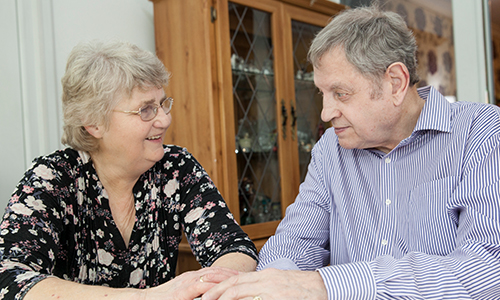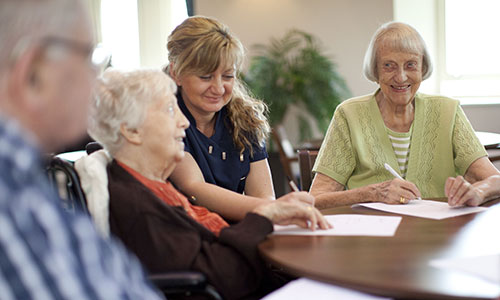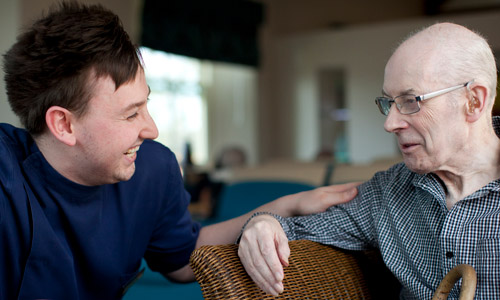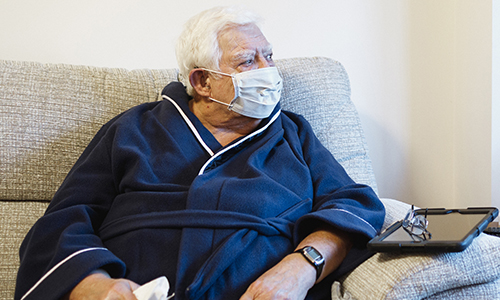When the pandemic began we knew older people would be facing a very difficult time, but we could not have foreseen just how catastrophic it would turn out to be. And while the situation has markedly improved thanks to the vaccination programme, we know that the pandemic continues to cast a long shadow over many people’s lives.
There seems no doubt that in future we will look back on this period as deeply traumatic for many older people. Age quickly proved to be a major risk factor for serious illness, with deaths hitting hardest amongst those aged over 65. But that’s not the only harm older people have experienced.
The long-term consequences of the pandemic
Through our research, our frontline services, our tens of thousands of dedicated campaigners, and our network of local Age UKs, we’ve heard from huge numbers of older people about their experiences. Older people who’ve never had to turn to Age UK told us they were struggling.
In practical terms, access to food, medicine and essential services has been extremely difficult at times for those unable to navigate the challenges brought about by the pandemic, and separated from the family, friends and support networks they could otherwise have relied on.
We’ve heard about the immense fear and anxiety living during these unprecedented times has caused; the long-term consequences of restrictions and shielding, the huge challenges of caring for a loved one and the harsh realities of facing bereavement alone. Above all we have heard a profound sense of loss for precious time and experiences they will not get back.
There's mounting evidence of the disastrous effects of the pandemic on many older people’s mental and physical health. Age UK has carried out 3 waves of research over the last two years which lays bare the extent of the decline. 1 in 4 older people tell us they now live in more pain or walk as far as they could before. 1 in 3 people are more anxious and have lost motivation to do the things they enjoy. Nearly a quarter say they find it harder to remember things, while the families and carers of people living with dementia have told us how their loved ones have deteriorated much more quickly than anyone expected.
What we do
Age UK’s vision is a world where everyone can love later life.
Loneliness, long-term health conditions and inequalities
The physical isolation of the pandemic has unleashed a crisis of loneliness, particularly acute for older people living alone or caring for a loved one.
Before the start of the pandemic, there were already 1.4 million chronically lonely older people in England, and many more across the rest of the UK. However by September 2021, after more than a year of prolonged periods cut off from society and apart from the people they know and love, more than 5 million older people told us they were feeling lonely. For older people with no local support networks, the closure of face-to-face services, like those offered by local Age UKs, was also a terrible blow.
Difficulties in accessing medical treatment, or an unwillingness to bother the NHS at such a stressful time, mean many older people’s illnesses and long-term health conditions have worsened. Fear of infection, particularly in the early months of the pandemic when care staff struggled to access the right PPE, led many older people and families to cancel care services as well.
People told us that they were unable to visit loved ones in care homes, and we heard what a devastating effect that had on care home residents, too many of whom sadly faced their last days, weeks and months feeling alone.
It is increasingly clear that some groups of older people have fared worse than others. Those on low incomes have been hit especially hard in terms of illness and death, among them disproportionately high numbers from Black, Asian, and other minority ethnic backgrounds. Older people who already had health conditions and care needs, as well as carers, have seen the greatest deterioration in their health, mobility and wider wellbeing.
Rising to the challenge
There was hope and solace to be found. The pandemic saw people of all ages come to the aid of their local communities, providing help with life’s essentials and companionship. Stories of the different ways that individuals, neighbourhood groups and charities helped older people in their communities is a celebration of human nature.
Age UK was among those determined to rise to the challenge. Demand for our telephone services has soared. Our Age UK Advice Line and Telephone Friendship Services helped older people who were confused, anxious, lonely, or in deep distress. More people than ever before visited the Age UK website, where our team turned often last-minute, complex, and confusing Government guidance into plain English.
Through our campaigns, we reached out to older people to understand the harsh reality of their day-to-day lives. This enabled us to speak their truth to those in power, the media, and the organisations spearheading the nation’s pandemic response.
Age UK’s expertise in health policy and influencing, underpinned by research to understand the depth and breadth of the impact of the pandemic on older people, meant we could support and challenge the Government, NHS England, and others on a range of issues from treatment protocols and end of life care to shielding support and maintain crucial services.
At a time when local Age UKs were facing challenges on a scale they’d never experienced before, we prioritised getting emergency funding, up to date information and support to them. Around the world, our Age International team worked with our delivery partner, HelpAge International, and local partners to reach thousands of older people in over 30 countries with vital humanitarian support, helping to protect them and reduce the spread of the virus.
Thanks to you, we will be there
We could not have achieved so much without our volunteers, our funders, our supporters, our campaigners, our partners, and of course the older people we’ve worked with and for this year who’ve kept us going and have been at the heart of our work.
While the easing of restrictions and the vaccination programme provides real hope, many older people have told us they’re worried about returning to ‘normality.’
The pandemic is likely to continue to dominate older people’s lives until spring 2022, if not beyond. It will take a long time to get over the damage of a period that has, for many, pressed the ‘fast forward button’ on ageing. Sadly, some never will recover. At Age UK we must, and we will, be there for them.
Annual Report 2020/21
The Age UK Annual Report and Accounts describes the activities of Age UK, its subsidiary charities and trading companies. It also refers to the activities of our local and national charity partners where we fully or partly fund those activities.





